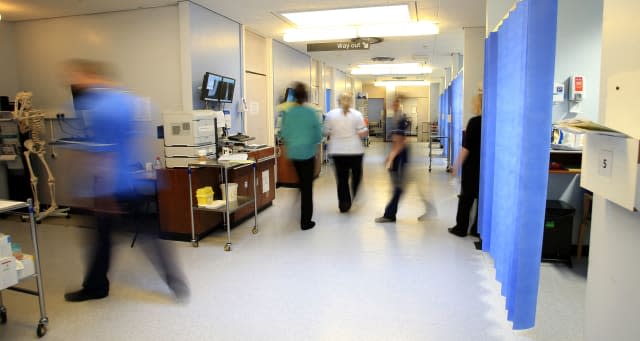5,000 extra deaths from heart disease as pandemic takes toll on other patients

Almost 5,000 more people have died from heart problems than would be expected since the start of the coronavirus pandemic, a charity has warned.
The British Heart Foundation (BHF) told the PA news agency that there were 4,622 “excess deaths” from heart and circulatory diseases from the start of the pandemic to mid-October.
As the Covid-19 second wave sets in, the charity has urged people to not put off seeking care.
It has previously called for action after noticing that hundreds of relatively younger adults have also been dying in higher numbers than expected for heart problems.
The charity calculated that in the under-65s alone there has been more than 800 additional deaths.
It said that a number of factors could be behind the excess deaths including:
– People putting off seeking care for fear of “putting pressure” on the NHS
– Patients who delay seeking care for worrying symptoms for fear of contracting Covid-19 in health settings
– Delays to surgeries and routine heart care
As the nation went into lockdown in late March there was a significant fall in people seeking help for suspected heart attacks.
The BHF has said that in late March the number of people attending A&E with a suspected heart attack dropped by 50% – but says numbers have since improved.
The charity reminded people that during the second national lockdown in England “the NHS is open for you”.
Dr Sonya Babu-Narayan, associate medical director at the British Heart Foundation, told the PA news agency: “We know that patients with heart and circulatory disease have been dying from it in numbers in excess of what we would expect since the beginning of the pandemic.
“And this is on top of also being at an increased risk of severe Covid-19 resulting in deaths.
“From the onset of the pandemic to October 16 there had been 4,622 excess deaths in England.
“I feel every death is a tragedy, no matter how old you are and what your circumstance, whether it’s from Covid-19 or not.
“Equally, going forward, we must learn lessons from this pandemic and it seems that it’s very important that we do maintain access to cardiovascular care despite the winter surge and coronavirus resurgence so that we can, wherever possible, reduce these excess deaths.”
Dr Babu-Narayan cited a YouGov poll which found that among patients who had noticed a worsening of their health conditions, 56% didn’t seek help for it because they did not want to put pressure on the health service.
Has your medical appointment or surgery been delayed due to coronavirus? Learn how to get the right help. https://t.co/I8AuItWa07
— BHF Scotland (@BHFScotland) September 24, 2020
Dr Babu-Narayan, who is also a consultant cardiologist, told the news agency: “I wouldn’t want people to be so worried about protecting the NHS that the patient doesn’t get protection themselves.
“If you have a heart condition remember the NHS is open for you. And it’s here to protect you, rather than you having to worry about protecting it.”
She continued: “The NHS is ready for you if you have an emergency or life threatening illness.
“So if you think you’re having a heart attack or you think you could be having a stroke – it’s vital that you still call 999 and go to the hospital. Every minute matters in terms of saving your life and avoiding disability from those conditions.
“For example if you’re getting more chest pain when you do things and that’s lasting for longer or you’re getting worse breathlessness when you do things …
“It’s really important you make sure you seek medical advice, because your situation may need to be reprioritized. And you may need to have your treatment brought forward or your investigation brought forward.
“If you are offered your regular check-up or appointment, don’t delay or reschedule because that could be a really important test for you to attend, and in no way is the lockdown intended to mean that you shouldn’t attend your hospital appointment when invited.”
Dr Nick Linker, national clinical director for heart disease for the NHS in England, said: “The NHS continued to offer treatment for urgent and routine heart problems throughout the pandemic and the number of people seeking emergency care quickly rebounded during the first wave, after some people had initial concerns about coming forward for care.
“Going into the second wave, hospitals are continuing to redesign services so that care can go ahead safely, and our message remains the same: if you have symptoms, help us help you by coming forward so we can get you the care you need.”


